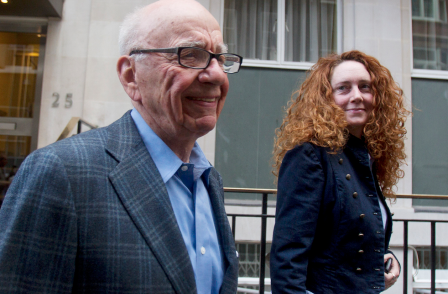
The return of Rebekah Brooks to her old job appears to nullify much of the work News Corp has done to distance itself from the hacking scandal in the UK.
She was cleared unanimously by a jury last year of conspiracy to hack phones, pay public officials and hide evidence. And like other journalists who have emerged on the other side of the frightful ordeal of being arrested, prosecuted and tried, she deserves now to be allowed to rebuild her career.
But the fact remains that hacking took place on her watch (as editor of the News of the World from 2000 to 2003) and that widespread illegal payment of public officials and police officers happened while she was editor of The Sun, from 2003 to 2007.
While she was chief executive of News International from 2009 to 2011 the company responded to The Guardian’s dogged investigation into phone-hacking throughout that period with arrogant denials and belligerent counter-attacks. With hindsight it looks like a textbook example of how not to handle a corporate crisis and ultimately cost the company its biggest selling newspaper and more than $500m so far.
News International was considered such a toxic brand that in June 2013 it was renamed News UK. The papers moved from Wapping to a new headquarters. A new PR team, headed by communications director for London mayor Boris Johnson Guto Harri, love-bombed the press.
Journalists were invited to meet the new executive team on several occasions. I recall much emphasis being given to the fact that almost none of the senior leadership around at the time of the hacking scandal were still in place.
So it is surprising that the executive who came to, rightly or wrongly, personify the hacking scandal at its peak has returned to her job.
Weighed against this is the fact that Brooks was (otherwise) a successful editor and chief executive.
Rupert Murdoch evidently rates her extremely highly and, as the controlling shareholder of parent company News Corp, that is ultimately what matters most.
His son James did not come out well from the hacking scandal. He was head of News Corp in Europe as it unfolded and at one point was accused of misleading Parliament. But his rehabilitation was completed in June this year when he was named as the new chief executive of 21st Century Fox, the more profitable half of the family business.
Michael Wolff spent hundreds of hours with Rupert Murdoch to research a biography (before badly falling out with him).
He told Press Gazette in March 2011 about the then Sun editor’s special relationship with Murdoch.
He said that she was someone he was “incredibly fond of, almost as a member of the family… At the same time he can say that Rebekah Wade [as she was then] is an incredible suck-up, he can also say that she holds a special position within News Corp.
“Rebekah's fundamental interest in the newspaper business is anticipating what Rupert wants. And she's good at that, she enjoys it. The high point of her week, of her career, is a kind word from Rupert."
Up until her resignation on 15 July 2011 (11 days after Milly Dowler phone-hacking revelation) no one can dispute the passion and commitment with which she sought to save the company, whatever the cost.
She rejoins the company at a time when it faces a new existential fight – to secure the future of The Sun.
The online paywall strategy has paid-off for The Times, seemingly helping it to shore up print sales whilst also growing a substantial subscription base.
But the launch of The Sun paywall two years ago has been a failure which has seen it slip behind The Independent in terms of overall monthly reach (print and online) according to the NRS figures, while attracting a comparatively tiny subscription base.
The challenge for Brooks and new Sun editor Tony Gallagher is to shore up print sales while catching up in the digital race. Print growth may be nigh-on impossible but there is plenty of scope to reduce a rate of decline which has been running at around 10 per cent year on year.
The online paywall has now been largely abandoned and The Sun will want to climb rapidly from its current position as the least visited UK national newspaper website. With 800,000 visitors per day on average in June it has less than a fifth the website traffic of the Mirror.
Whatever the short-term PR hit of Rebekah's return, Rupert Murdoch clearly believes that she is the best qualified person long-term to turn The Sun into a successful digital business.
Email pged@pressgazette.co.uk to point out mistakes, provide story tips or send in a letter for publication on our "Letters Page" blog
